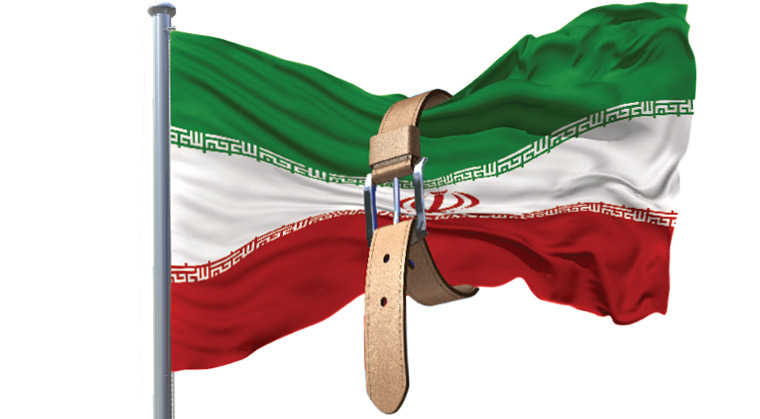Trump Tightens the Screws on Iran


T
he White House isn’t wasting any time: One week after President Trump withdrew the US from the Iran nuclear deal, the Treasury Department imposed new sanctions on Iran’s central bank, labeling its head a global terrorist and accusing him of funneling money to Hezbollah. The Treasury Department also broke up a currency exchange network in Dubai that it said was directing money to the Islamic Revolutionary Guard Corps, Iran’s foreign expeditionary force. Those moves were on top of sanctions reimposed on May 8, when the United States withdrew from the Joint Comprehensive Plan of Action (JCPOA).
The series of actions will make it harder for Iran to do business with the outside world, with the goal of drying up the money that funds Iran’s malign activities across the world.
Richard Goldberg, who helped craft some of the original Iran sanctions when he was a foreign policy aide to former Illinois senator Mark Kirk, sees the new measures as a “global wake-up call.” Goldberg, who currently serves as a senior advisor at the Foundation for Defense of Democracies (FDD), says the new sanctions serve as a reminder for governments and companies worldwide not to do business with Iran. “These are sanctions that remind the international business community that no matter what you think of President Trump’s decision to withdraw from the JCPOA, the Iranian banking sector is completely connected to terrorism, and to the Quds Force [of the Revolutionary Guards],” he says. “That means that if you do business with Iran’s financial sector, you are exposing your bank, your business, to potential terror financing activities.”
The action against the currency exchange network will also bite, according to Goldberg. Once Iranians are unable to exchange their rials for dollars, they’ll be stuck with a currency that is rapidly depreciating. “Cutting off the regime from hard currency and from foreign exchange trading is a potentially fatal blow to the sustainability of the regime,” he said.
When I asked Goldberg if he thinks the Trump administration is pushing for regime change in Tehran by way of sanctions and pressure, he said that while he White House would welcome such an outcome, he isn’t sure it’s the immediate goal.
“I think this is a part of a comprehensive strategy to roll the Iranians back to their borders, to push them out of Syria, out of Yemen, to make their hold in Iraq a little looser, and at some point to have them cease their nuclear program, and cease their missile programs. [The aim is to foment] an overall behavioral change, to force the regime to choose its own survival, fundamentally changing course in what it does in the world.”
The European Union is currently meeting with Iranian officials in an effort to save the nuclear deal, but Goldberg says the Europeans are slowly accepting that it’s a lost cause. In the end, Europe will choose trade with the United States over trade with Iran.
“Whatever objections Europe will raise, and notwithstanding attempts to protect their companies, they understand that it’s not going to work,” he says. “They’re not going to force their companies to choose between the US and Iran, and they’re not going to engage in any sort of trade war with the United States. And so, in many ways it’s like going through the stages of grief: There’s the immediate anger followed by denial.” I think President Macron [of France] skipped straight to the stage of acceptance. But there are still a lot of people in Europe, especially in Germany, who are still in the bargaining phase, trying to find a way to hold on, not quite ready to accept that the deal is over.”
Interestingly, Goldberg said the Trump administration’s recent moves on Iran send a powerful message to North Korea. Contrary to the conventional wisdom, he says the cancellation of the Iran deal signals to the Koreans that they can’t expect a similar arrangement from the United States.
“I think what [Trump’s] done with Iran is to try to align policies so that during negotiations Kim Jong-un can’t say, ‘Well, I want what you gave Iran.’ I think he’s concerned that Kim and North Korea will look at the nuclear deal with Iran and say, ‘Well, we can negotiate that. We’ll get to keep everything, we’ll get economic relief, we’ll get to keep our missiles. We can keep on enriching uranium, and when we’re ready, we’ll kick everybody out like we did in the past and end up a stronger nuclear power with a better economy.’
“So, I think the Trump administration had already started imposing maximum pressure on North Korea. And I think they were signaling to Kim, ‘We’re not going to relieve maximum pressure one bit until we get what we want. Look at what we just did to Iran, putting the pressure back on. You’re not going to get what Barack Obama gave Iran, because we just took it away. We expect full denuclearization from both of you.” (Originally featured in Mishpacha, Issue 711)
Oops! We could not locate your form.













